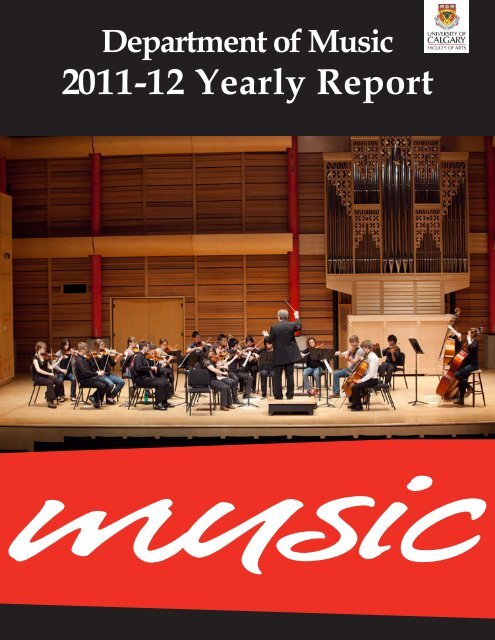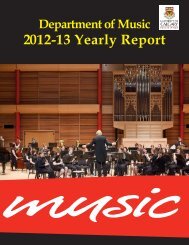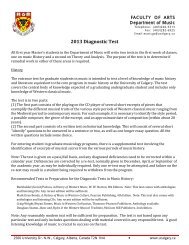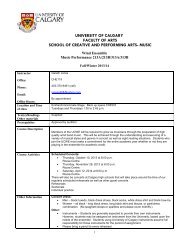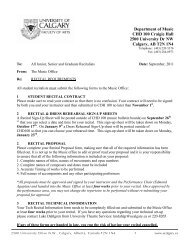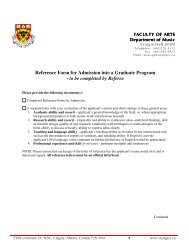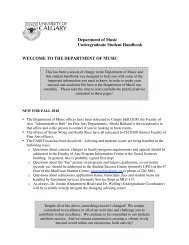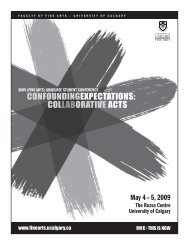2011-12 Yearly Report - Department of Music - University of Calgary
2011-12 Yearly Report - Department of Music - University of Calgary
2011-12 Yearly Report - Department of Music - University of Calgary
You also want an ePaper? Increase the reach of your titles
YUMPU automatically turns print PDFs into web optimized ePapers that Google loves.
<strong>Department</strong> <strong>of</strong> <strong>Music</strong><br />
<strong>2011</strong>-<strong>12</strong> <strong>Yearly</strong> <strong>Report</strong><br />
1
<strong>2011</strong>/<strong>12</strong> <strong>Department</strong> <strong>of</strong> <strong>Music</strong><br />
<strong>Yearly</strong> <strong>Report</strong><br />
Legend for Concert Series attendance tables:<br />
â<br />
C = Celebration Series<br />
D = Discovery Series<br />
O = Organ Series<br />
J = Monday Night Jazz Series<br />
S = Special Series<br />
SEPTEMBER <strong>2011</strong>: During the month <strong>of</strong> September, Canadian Flutist Christie Reside accompanied by pianist<br />
Kathleen van Mourik kicked <strong>of</strong>f the <strong>Department</strong> <strong>of</strong> <strong>Music</strong>’s concert season with The Blackbird Sings: <strong>Music</strong> for<br />
Flute and Piano.<br />
MASTERCLASSES:<br />
1. Christie Reside, flute: Principal flute in the Vancouver Symphony Orchestra<br />
CONCERT DATE ARTISTS ATTENDANCE VENUE<br />
September 17/11 Christie Reside (C) 208 Eckhardt-Gramatté<br />
OCTOBER <strong>2011</strong>: In the month <strong>of</strong> October, Tommy Banks performed in our Monday Night Jazz Series, Canadian<br />
organist Christina Hutten played in a co-production between the <strong>Department</strong> <strong>of</strong> <strong>Music</strong> and Mount Royal’s Organ<br />
Festival and Charles Foreman performed his third <strong>of</strong> six Liszt concerts.<br />
MASTERCLASS:<br />
1. Christina Hutten, organ: Up and coming Canadian organist and harpsichordist<br />
CONCERT DATE ARTISTS ATTENDANCE VENUE<br />
October 3/11 Tommy Banks (J) 258 <strong>University</strong> Theatre<br />
October 18/11 Christina Hutten (O) 117 Eckhardt-Gramatté<br />
October 22/11 Charles Forman (C) 215 Eckhardt-Gramatté<br />
NOVEMBER <strong>2011</strong>: November was brimming with music performances including contemporary pianist Yoko<br />
Hirota, Montreal jazz quartet Donato-Bourassa-Lozano-Tanguay and tenor Timothy Shantz with pianist Marilyn<br />
Engle performing the entire Winterreise cylce. We also hosted the <strong>2011</strong> E-Gre Winner’s Tour and French organist<br />
Jean-Willy Kunz.<br />
MASTERCLASSES:<br />
1. Donato-Bourassa-Lozano-Tanguay: Montreal Jazz quartet<br />
2. St. Lawrence String Quartet: Stanford based String quartet<br />
3. Paul Merkelo, trumpet: Renowned North America trumpet player<br />
1. Jean Willy Kunz, organ: Montreal organist<br />
1
NOVEMBER Cont’d<br />
CONCERT DATE ARTISTS ATTENDANCE VENUE<br />
November 5/11 Yoko Hirota (D) 107 Eckhardt-Gramatté<br />
November 7/11 Donato-Bourassa-Lozano-Tanguay (J) 111 Beat Niq<br />
November 19/11 Timothy Shantz/Marilyn Engle (C) 247 Eckhardt-Gramatté<br />
November 20/11 Erica Iris Huang (EG Winner) 27 Eckhardt-Gramatté<br />
November 29/11 Jean Willy Kunz (O) 47 Eckhardt-Gramatté<br />
DECEMBER <strong>2011</strong>: The U<strong>Calgary</strong> String Quartet began their first <strong>of</strong> three Celebration <strong>of</strong> Brahms performances.<br />
CONCERT DATE ARTIST ATTENDANCE VENUE<br />
December 2, <strong>2011</strong> U<strong>Calgary</strong> String Quartet (S) 150 Eckhardt-Gramatté<br />
Fall <strong>2011</strong> Student Ensemble Stats Table<br />
DATE ENSEMBLE TICKETS ATTENDANCE CONCESSION VENUE<br />
Nov.14/11 Jazz Ensemble 100 102 Open UT<br />
Nov.22/11 Mostly Guitars 75 62 Open EG<br />
Nov.24/11 Orchestra 100 114 Open EG<br />
Nov.27/11 Wind Ensemble 150 232 Open EG<br />
Nov.28/11 World <strong>Music</strong> 250 248 Open EG<br />
Nov.30/11 Brass & Percussion 50 66 Open EG<br />
Nov.30/11 Chamber <strong>Music</strong> Free Recital Hour Closed EG<br />
Dec. 1/11 Chamber Choir 150 144 Open EG<br />
Dec. 2/11 Chamber <strong>Music</strong> Free Recital Hour Closed EG<br />
Dec. 5/11 Symphonic Band <strong>12</strong>5 181 Open EG<br />
Dec. 6/11 <strong>University</strong> Chorus 250 255 Open EG<br />
Dec.7/11 Collegium <strong>Music</strong>um 75 86 Open EG<br />
Fall Semester Community Performances: None<br />
JANUARY 20<strong>12</strong>: This month Charles Foreman played his fourth <strong>of</strong> six Liszt concerts, New York big band<br />
conductor Maria Schneider performed with the <strong>Calgary</strong> Jazz Orchestra and the U <strong>of</strong> C Jazz Ensemble and the RBC<br />
Concerto Competition took place. The <strong>Department</strong> <strong>of</strong> <strong>Music</strong> also hosted the Cantos Pipe! Pipe! Hooray! organ<br />
program and the Happening 20<strong>12</strong> Festival <strong>of</strong> New <strong>Music</strong> and Media.<br />
CONCERT DATE ARTISTS ATTENDANCE VENUE<br />
January 10/<strong>12</strong> RBC Concerto Competition 222 Eckhardt-Gramatté<br />
January 14/<strong>12</strong> Charles Foreman (C) 181 Eckhardt-Gramatté<br />
January 23/<strong>12</strong> Maria Schneider (J) 410 <strong>University</strong> Theatre<br />
2
20<strong>12</strong> Happening Festival <strong>of</strong> New <strong>Music</strong> and Media<br />
CONCERT DATE CONCERT NAME ATTENDANE VENUE<br />
January 25/<strong>12</strong> Preludes & Beneath the Forest Floor 76 Eckhardt-Gramatté<br />
January 26/<strong>12</strong> Sixtrum 90 Eckhardt-Gramatté<br />
January 27/<strong>12</strong> Debussy to Westerkamp 51 Eckhardt-Gramatté<br />
January 28/<strong>12</strong> Debussy 150th 205 Eckhardt-Gramatté<br />
FEBRUARY 20<strong>12</strong>: In February the <strong>Department</strong> <strong>of</strong> <strong>Music</strong> hosted three concerts involving Quebec violin and<br />
guitar twosome Duo Aperio, organist Neil Cockburn and the Chris Andrew Quintet. We also hosted the Alberta<br />
International Band Festival.<br />
MASTERCLASSES:<br />
1. Peter Kolkay, bassoon: Chamber <strong>Music</strong> Society <strong>of</strong> the Lincoln Centre<br />
2. Davie Shifrin, clarinet: Chamber <strong>Music</strong> Society <strong>of</strong> the Lincoln Centre<br />
3. Ensemble Nikel: International contemporary music quartet<br />
CONCERT DATE ARTISTS ATTENDANCE VENUE<br />
February 7/<strong>12</strong> Neil Cockburn (O) 91 Eckhardt-Gramatté<br />
February 11/<strong>12</strong> Duo Aperio (D) 141 Eckhardt-Gramatté<br />
February 27/<strong>12</strong> Chris Andrew Quintet (J) 69 Beat Niq<br />
MARCH 20<strong>12</strong>: In the month <strong>of</strong> March, the U<strong>Calgary</strong> String Quartet performed their second Celebration <strong>of</strong><br />
Brahms concert, Ensemble Made in Canada performed a premiere piece by John Burge and electric guitarist Chris<br />
Tarry joined jazz quintet Verismo to perform in the Monday Night Jazz Series.<br />
CONCERT DATE ARTISTS ATTENDANCE VENUE<br />
March 2/<strong>12</strong> U<strong>Calgary</strong> String Quartet (S) 135 Eckhardt-Gramatté<br />
March 24/<strong>12</strong> Ensemble Made in Canada (C) 175 Eckhardt-Gramatté<br />
March 26/<strong>12</strong> Verismo (J) 119 <strong>University</strong> Theatre<br />
MASTERCLASSES:<br />
1. Eric St. Laurent Trio: Montreal jazz trio<br />
2. Susan Hoeppner, flute: Flutist and faculty member <strong>of</strong> the U <strong>of</strong> T and the Royal Conservatory <strong>of</strong> <strong>Music</strong><br />
3. Ensemble Made in Canada: One <strong>of</strong> Canada’s premiere piano quartets<br />
APRIL 20<strong>12</strong>: This month the <strong>Department</strong> <strong>of</strong> <strong>Music</strong> held two concerts with performances by the world music Safa<br />
Ensemble and the Alex Goodman/Brent Mah Quartet.<br />
CONCERT DATE ARTISTS ATTENDANCE VENUE<br />
April 14/<strong>12</strong> Safa Ensemble (D) 98 Eckhardt-Gramatté<br />
April 23/<strong>12</strong> Alex Goodman/Brent Mah Quartet (J) 72 Eckhardt-Gramatté<br />
MASTERCLASSES:<br />
1. Andrew McCandless, trumpet: Principal Trumpet <strong>of</strong> the Toronto Symphony<br />
2. Stile Antico – British voice ensemble<br />
3
Winter 20<strong>12</strong> Student Ensemble Stats Table<br />
DATE ENSEMBLE TICKETS ATTENDANCE CONCESSION VENUE<br />
Mar. 4/<strong>12</strong> Orchestra 100 83 Open EG<br />
Mar. 19/<strong>12</strong> World <strong>Music</strong> 250 175 Open EG<br />
Mar. 27/<strong>12</strong> Mostly Guitars 75 26 Open EG<br />
Mar. 27/<strong>12</strong> Jazz Ensemble 100 <strong>12</strong>7 Open UT<br />
Mar. 28/<strong>12</strong> Chamber Choir 150 91 Open EG<br />
April 1/<strong>12</strong> Wind Ensemble 250 99 Open EG<br />
April 2/<strong>12</strong> Chamber <strong>Music</strong> Free Recital Hour Closed EG<br />
April 2/<strong>12</strong> Brass & Percussion 50 54 Open EG<br />
April 3/<strong>12</strong> Orchestra 100 77 Closed EG<br />
April 4/<strong>12</strong> Collegium <strong>Music</strong>um 75 44 Open EG<br />
April 4/<strong>12</strong> Chamber <strong>Music</strong> Free Recital Hour Closed EG<br />
April 5/<strong>12</strong> Symphonic Band <strong>12</strong>5 155 Open EG<br />
April <strong>12</strong>/<strong>12</strong> <strong>University</strong> Chorus 200 197 Open EG<br />
Winter Semester Community Performances:<br />
1. Various U <strong>of</strong> C Chamber <strong>Music</strong> ensembles performed at the Cathedral Church <strong>of</strong> the Redeemer as part <strong>of</strong><br />
the <strong>Calgary</strong> Public Library’s “<strong>Music</strong> in March Series.”<br />
MAY 20<strong>12</strong>: In the month <strong>of</strong> May, the <strong>Department</strong> <strong>of</strong> <strong>Music</strong> hosted the 20<strong>12</strong> Graduate Student Conference<br />
“Confounding Expectations – <strong>Music</strong> and the Creative Act.” Presenters for this two-day event hailed from<br />
various universities including British Columbia, <strong>Calgary</strong>, Montreal, Toronto, Newfoundland,<br />
Massachusetts and Padua Italy. The U<strong>Calgary</strong> String Quartet also performed their final Celebration <strong>of</strong><br />
Brahms concert with the world-renowned pianist Anton Kuerti.<br />
CONCERT DATE ARTISTS ATTENDANCE VENUE<br />
May 18/<strong>12</strong> U<strong>Calgary</strong> String Quartet (S) 226 Eckhardt-Gramatté<br />
JUNE 20<strong>12</strong>: The Contrasts Chamber <strong>Music</strong> Festival featured performances by the U<strong>Calgary</strong> String Quartet,<br />
members <strong>of</strong> the <strong>Calgary</strong> Philharmonic Orchestra, U <strong>of</strong> C and Beijing Conservatory music faculty, alumni, and<br />
guests. <br />
CONCERT DATE ARTISTS ATTENDANCE VENUE<br />
May 25/<strong>12</strong><br />
U<strong>Calgary</strong> String Quartet, Lev<br />
Nesterov, Brett Gunther &<br />
74<br />
Eckhardt-Gramatté<br />
Michalis Androniku<br />
May 27/<strong>12</strong><br />
Adrianna Lebedovich, Lana<br />
Henchell, Jeremy Brown, Russell<br />
96<br />
Eckhardt-Gramatté<br />
Broom, Rod Squance & Gwen<br />
Klassen<br />
June 1/<strong>12</strong><br />
Yan Tao, Xu Yulian, Yan Rui, Li<br />
Ziang, Edmond Agopian, Rod<br />
108<br />
Eckhardt-Gramatté<br />
Squance & Marilyn Engle<br />
June 3/<strong>12</strong><br />
Krill Kalmykov, Julia Haager &<br />
Edmond Agopian<br />
70<br />
Eckhardt-Gramatté<br />
4
Grant Support<br />
The <strong>Department</strong> <strong>of</strong> <strong>Music</strong> applied for AFA (Alberta Foundation for the Arts) grants and received the following<br />
support for the <strong>2011</strong>/<strong>12</strong> Season:<br />
Celebration/Discovery Series - $9,400<br />
Organ Series - $2,500<br />
Happening Festival <strong>of</strong> New <strong>Music</strong> and Media - $1,400<br />
CONTRASTS Chamber <strong>Music</strong> Festival- $3,650<br />
<strong>2011</strong>/<strong>12</strong> <strong>Department</strong> <strong>of</strong> <strong>Music</strong> Related News Articles<br />
*Please see attached articles<br />
5
Local pianist takes on<br />
hyphenated Liszt<br />
By Bob Clark, <strong>Calgary</strong> Herald (October 20, 20<strong>12</strong>)<br />
Foreman now halfway through series <strong>of</strong> six ‘shows’<br />
Atouch <strong>of</strong> Lisztomania, perhaps. No, we’re not talking here about the kind <strong>of</strong> mid-19th-century hysteria —<br />
swooning and screaming female fans — that greeted piano superhero Franz Liszt’s prodigious public bouts<br />
<strong>of</strong> keyboard legerdemain and showmanship.<br />
Nor are we talking about the rock operatic 1975 Ken Russell Hollywood fantasy starring Roger Daltrey <strong>of</strong><br />
the Who as Liszt (with Ringo Starr as the pope).<br />
Rather, we’re speaking <strong>of</strong> the six-concert, three-year Liszt series performed by <strong>Calgary</strong> pianist Charles<br />
Foreman.<br />
The third instalment <strong>of</strong> Foreman’s ambitious cycle is a show — and performances <strong>of</strong> all-Liszt programs do<br />
tend to be “shows” — titled The Hyphenated Liszt. (Foreman gave Beethoven and Chopin similar cyclic<br />
treatment, in previous seasons)<br />
The concert takes place on Saturday at the Rozsa Centre’s Eckhardt-Gramatte Hall.<br />
The title comes from the fact that Liszt, whose vital dates are 1811-1886, transcribed just about everything<br />
by others he could get his hands on: songs, orchestral and instrumental pieces and operas, you name it.<br />
And when you do that, it’s customary to attach your name to that <strong>of</strong> the actual composer with a hyphen.<br />
Thus, Schubert-Liszt, Wagner-Liszt, and so on.<br />
“If I’m doing a six-concert series <strong>of</strong> Liszt, I need to at least make a nod towards his transcriptions —<br />
because he did so many <strong>of</strong> them,” says Foreman.<br />
The first half <strong>of</strong> his program on Saturday features transcriptions <strong>of</strong> two wellknown songs by Schubert, two<br />
by Chopin and two <strong>of</strong> Schubert’s Soirees de Vienne (waltzes). The set ends with Liszt’s take on Camille<br />
Saint-Saens’s evergreen Halloween (and Fantasia) classic, Danse Macabre.<br />
After intermission comes A Night at the Opera (“but not as funny,” Foreman quips), <strong>of</strong>fering music by<br />
Wagner, Donizetti, Verdi and Gounod — as seen through the miraculous hands and very original musical<br />
mind <strong>of</strong> Liszt.<br />
Liszt’s transcriptions, which fall into the category <strong>of</strong> literal, paraphrase or over-the-top fantasy, served a<br />
very useful purpose in an age that long predated recordings, Foreman says.<br />
It was a time when, if you didn’t live in a major city, you couldn’t hear orchestral concerts. (And if you did,<br />
they were probably badly played, at least according to the eyewitness accounts <strong>of</strong> bad boy French composer<br />
Hector Berlioz).<br />
“So for music lovers to get to know this music, either you had to be adept enough to (sight) read a score, or<br />
you had to have some other version (<strong>of</strong> the music), such as Liszt’s piano transcriptions <strong>of</strong> the big orchestral<br />
pieces — which would have been very convenient for a decent amateur pianist,” Foreman says.<br />
Foreman’s virtuoso Liszt show begins at 8 p.m. Tickets: At the door, or 403-2207202.<br />
6
Playing to royalty<br />
<strong>Music</strong> instructor’s winning composition to be performed for the royals.<br />
by Jennifer Myers<br />
Zachary Wadsworth, a composer and instructor for the music department, submitted the winning entry to a<br />
competition sponsored by the King James Bible Trust for an original musical score. The competition is part<br />
<strong>of</strong> the 400th anniversary celebrations <strong>of</strong> the King James Bible.<br />
Wadsworth’s composition, created for choir and organ, will be performed at Westminster Abbey in<br />
London, England in the presence <strong>of</strong> Her Majesty The Queen, His Royal Highness The Duke <strong>of</strong> Edinburgh,<br />
and His Royal Highness The Prince <strong>of</strong> Wales on November 16. It will be the featured anthem in a service<br />
that will close <strong>of</strong> a year <strong>of</strong> celebrations marking the 400th anniversary <strong>of</strong> the publication <strong>of</strong> the King James<br />
Bible. Wadsworth’s composition will also be published by Novello, a prestigious publisher <strong>of</strong> sacred<br />
music.<br />
“I have written a lot <strong>of</strong> sacred music and performed it, but this is the first competition that spoke directly to<br />
my area <strong>of</strong> expertise,” says Wadsworth, who completed his Doctorate from Cornell <strong>University</strong> just last<br />
spring. “I have been singing from Novello’s scores for years, so the idea that I get to be a part <strong>of</strong> this<br />
tradition is very special.”<br />
Entrants were asked to select passages from the King James Bible that have not previously been set to<br />
music. Wadsworth chose several sections from the Book <strong>of</strong> Job.<br />
“Most sacred music uses poetic texts,” says Wadsworth. “This bible is mostly in prose, so I looked for<br />
passages that seemed to have a kind <strong>of</strong> rhythm. The Book <strong>of</strong> Job does. It also articulates dramatic nature<br />
imagery and the mystery <strong>of</strong> god. It is beautifully written in old Shakespearean language. The best texts<br />
encourage you to make good compositional decisions.”<br />
The piece, titled Out <strong>of</strong> the South Cometh the Whirlwind, will be performed by the Choir <strong>of</strong> Westminster<br />
Abbey, which also performed at the recent royal wedding, and conducted by James O’Donnell. The<br />
Archbishop <strong>of</strong> Canterbury will preside over the service.<br />
Wadsworth will travel to London with his family for the event. Following the service, he and other guests<br />
will be treated to a reception in the Jerusalem Chamber, the room in Westminster Abbey where eminent<br />
churchmen <strong>of</strong> the time originally translated the King James Bible to English in 1611. The Prince <strong>of</strong> Wales<br />
is the Patron for the King James Bible Trust and is also slated to attend the reception.<br />
Wadsworth teaches courses in music theory and musicianship for the <strong>Department</strong> <strong>of</strong> <strong>Music</strong>. Various <strong>of</strong> his<br />
compositions have been performed previously by the Boston Metro Opera, the Washington National Opera<br />
Chorus and the Richmond Symphony Chorus to name a few.<br />
Photo caption: Zachary Wadsworth is congratulated by the Dean <strong>of</strong> Westminster Abbey in spring <strong>2011</strong><br />
when his composition was selected as the winner by the King James Bible Trust.<br />
7
Organist attains prestigious diploma<br />
By Caitlyn Spencer<br />
The <strong>University</strong> <strong>of</strong> <strong>Calgary</strong>’s John Bouz, an organist, composer, and music MA student, ran a full concert<br />
schedule last year, at one point playing four concerts in four days. This year, however, saw him focusing on<br />
rigorous study in preparation for the Royal Canadian College <strong>of</strong> Organists’ Fellowship Diploma, the<br />
highest certification <strong>of</strong>fered by the RCCO.<br />
“Since the institution’s founding about 100 years ago, there have been roughly 100 diplomas awarded by<br />
examination in Canada,” says Bouz.<br />
Though nine months <strong>of</strong> focused study and practice preceded his taking the examination, Bouz, who began<br />
playing organ at eleven for the Catholic church in Sundre where he grew up, counts years <strong>of</strong> experience as<br />
the real preparation. His hard work paid <strong>of</strong>f: not only did Bouz pass, but he also received the Willan<br />
Scholarship for highest marks nation-wide and the Doreen Porter Prize for the highest practical<br />
examination marks.<br />
Bouz attributes much <strong>of</strong> his success to a semester <strong>of</strong> organ lessons with Neil Cockburn, one <strong>of</strong> the<br />
performers in this year’s Organ Series. “I owe much <strong>of</strong> my success to Neil’s encouragement and expertise,”<br />
Bouz says. “<strong>Calgary</strong> is very fortunate to have a musician <strong>of</strong> Neil’s caliber.”<br />
Bouz’s achievements aren’t limited to the organ: he also plays piano and keyboard, and identifies primarily<br />
as a composer. “I began composing – though I didn’t involve myself in writing the music out – before I<br />
started piano lessons,” he says.<br />
Beyond a regular schedule <strong>of</strong> work playing for weddings, funerals, and church services, Bouz is looking<br />
forward to attending organ concerts as an audience member this year. He is especially excited for the<br />
<strong>Calgary</strong> Organ Festival, Oct. 6-21, which will include a performance by Christina Hutten presented by the<br />
<strong>University</strong> <strong>of</strong> <strong>Calgary</strong> music department.<br />
In the meanwhile, Bouz will be TAing and working on his MA thesis, supervised by Friedemann Sallis<br />
(music) and Suzanne Curtin (psychology). “My thesis presents the argument that principles <strong>of</strong> auditory<br />
perception ought to play a foundational role in music analysis, although not at the exclusion <strong>of</strong> other<br />
methods <strong>of</strong> analysis,” he explains.<br />
Learn more about the Fellowship Diploma and the Royal Canadian College <strong>of</strong> Organists. For more<br />
information on the <strong>Department</strong> <strong>of</strong> <strong>Music</strong>’s Organ Series, beginning October 18, click here.<br />
CALGARY - Lola Rozsa, who passed away on Sunday at the age <strong>of</strong> 92, was a great lady in the old<br />
tradition <strong>of</strong> grace, kindness and generosity <strong>of</strong> spirit, but also just a real dear when it came to putting a<br />
nervous arts reporter at ease.<br />
The first time I met Lola was in June 2000, several years after moving to <strong>Calgary</strong> and a few months after<br />
arriving at the Herald.<br />
The <strong>Calgary</strong> Philharmonic had struck a new annual award — the Gold Baton Award — to honour local<br />
philanthropy towards the orchestra.<br />
The inaugural recipients were to be Lola and her retired oilman husband, Ted, both longtime CPO boosters.<br />
8<br />
I took a cab to their comfortable but unostentatious house in Canyon Meadows, regretting not having<br />
written down questions beforehand to ask a couple with a reputation for giving an awful lot <strong>of</strong> money —<br />
more than $13 million to date, through the Rozsa Foundation she and Ted established in 1990 — to help<br />
fund arts groups, galleries and musicians across Alberta. (Their philanthropy was also felt in the <strong>Calgary</strong><br />
medical community.) I needn’t have worried.
<strong>Music</strong> to Move and Inspire<br />
By Bob Clark, <strong>Calgary</strong> Herald (January 19, 20<strong>12</strong>)<br />
No, it's not the title <strong>of</strong> a gospel concert, nor <strong>of</strong> an evening dedicated to You'll Never Walk Alonetype music<br />
<strong>of</strong> inspiration.<br />
It's a concert <strong>of</strong> original Big Band compositions written by New York-based band leader Maria Schneider,<br />
who conducts two <strong>Calgary</strong> groups in the performance <strong>of</strong> her music on Monday at the <strong>University</strong> Theatre -<br />
the <strong>Calgary</strong> Jazz Orchestra and the <strong>University</strong> <strong>of</strong> <strong>Calgary</strong> Jazz Ensemble.<br />
Admittedly, there aren't many women conducting Big Bands today, nor have there ever been (if any)? I<br />
venture.<br />
No, says Schneider, whose high-pr<strong>of</strong>ile career was launched in 1994 with the release <strong>of</strong> the recording,<br />
Evanescence, consisting <strong>of</strong> music she composed for her own 17-member collective, the Maria Schneider<br />
Orchestra.<br />
"The whole jazz world is mainly men," Schneider says. "I mean, jazz evolved mainly out <strong>of</strong> a culture, and<br />
that culture existed in jazz clubs late at night in an era when women were raising families.<br />
"There weren't that many women at that time who found a way to do both things."<br />
Today, however, with the growing prominence <strong>of</strong> jazz and jazz ensembles - in high schools and on college<br />
campuses, for example - the whole picture is changing, Schneider points out.<br />
"But, for me - honestly, I have to tell you my energy has not been focused on that (issue)."<br />
Asked whether big band music today has become part <strong>of</strong> an active repertoire, Schneider replies, "It depends<br />
what you're talking about."<br />
Turns out a lot <strong>of</strong> people in New York and elsewhere are starting up large jazz ensembles to showcase their<br />
own work.<br />
So, lots <strong>of</strong> original stuff from a growing number <strong>of</strong> jazz composers? Yes, says Schneider, whose own music<br />
has been described as a stylistic blend <strong>of</strong> avant-garde jazz and modern classical.<br />
She cites the influence and inspiration <strong>of</strong> one <strong>of</strong> the great mentors <strong>of</strong> contemporary jazz composers, Bob<br />
Brookmeyer, who passed away a month ago.<br />
"It was inspiring to a generation <strong>of</strong> people who didn't see such big divisions between the world <strong>of</strong> classical<br />
music and jazz, who somehow wanted to connect what they loved about both."<br />
After speaking with Schneider, you come away with the sense that large jazz ensembles are indeed alive<br />
and well, and can fend quite well for themselves in a post-golden age <strong>of</strong> the big band.<br />
Says Schneider: "I don't do this as some kind <strong>of</strong> reverence to an era gone by that we need to keep alive. Far<br />
from it."<br />
Sure, she adds, "there are musicians out there who are very reverential about the history <strong>of</strong> jazz and their<br />
place in it.<br />
"But me, I'm just trying to make music I like - and that's hard enough without politics and tradition, and all<br />
the things that go with them, added into the mix.<br />
"I'm just trying to write good music."Showtime is 8 p.m. Tickets: At the door, or call 403-220-7202.<br />
9
Soundwalking With Hildegard Pt. 1<br />
Carey Rutherford, examiner.com (January 25, 20<strong>12</strong>)<br />
What would you do if you were sitting in a formal concert hall, dressed for a night <strong>of</strong> highly educated<br />
performances by acclaimed composers, and you began hearing a cricket, very clearly, and no-one seemed<br />
particularly perturbed, and it began to develop harmonically and chronologically, transforming into<br />
something quite beyond the normal sound <strong>of</strong> a single cricket, developing rhythmically and musically until it<br />
swims through your awareness like a goldfish? Or a horse-sized cricket.<br />
Losing your mind? Acid flashback? Another dream like those you’ve been having while driving (I’ll just<br />
get out here, if you don’t mind . . .)?<br />
Or, Hildegard Westerkamp’s famous “Cricket Voice” (1987), intended to draw your awareness to the<br />
subtleties <strong>of</strong> sound and silence which most urban dwellers (and many rural dwellers) have lost contact with.<br />
“We have unlearned to use our ears in our society, so to me it’s still very important to be able to speak<br />
about this; to work with people, faculty, students, anybody really, on ‘How do we listen?’ To bring people<br />
to the awareness <strong>of</strong> their own listening, and to understand ‘What kind <strong>of</strong> listener are we?’ ‘What is our<br />
relationship via the ear to the environment?’ and ‘Do we know what’s going on out there aurally?’<br />
“In my compositions I’m putting that into an artistic context, where the listening is transformed into a<br />
contemplation <strong>of</strong> a place or a situation in a more musical sense.”<br />
Though she’s participating in Happening 20<strong>12</strong>: A Festival <strong>of</strong> New <strong>Music</strong> and Media as a composer, if it<br />
sounds like Ms. Westerkamp is a ‘listening counsellor, she doesn’t disagree:<br />
“A bit, yes. Finding out whether we have a relationship in our listening sense to our environment, and,<br />
though it’s always been important, why is that important now? That’s why we do soundwalks, because that<br />
gives you the opportunity to spend an hour <strong>of</strong> extraordinary listening to the environment, which is an<br />
unusual experience. We don’t do that normally. But that gives us a chance to practice that kind <strong>of</strong> listening<br />
as if it was the kind <strong>of</strong> listening that we do in concerts. That experience <strong>of</strong> not speaking and just listening to<br />
our environment usually has a strong impact on people because it’s new: they are beginning to subtly notice<br />
things in the (sound) environment that you don’t when you’re preoccupied with work or whatever.”<br />
Hildegard and her more prosaic contemporaries rub shoulders this week at the <strong>University</strong> <strong>of</strong> <strong>Calgary</strong>’s<br />
Happening Festival from January 25 - 28, mostly ;in their amazing Eckhardt-Gramatté Hall. The daytime<br />
and evening events will include world premieres, workshops, local and international performers and<br />
composers, pre-concert talks before every performance, and, maybe, crickets.<br />
“It’s hard to be a night in the desert/Without the crickets/You make it with stars” - Norbert Ruebsaat<br />
More to come . . . .<br />
10
Student’s piece to be performed at Carnegie Hall<br />
January 26, 20<strong>12</strong><br />
By Caitlyn Spencer<br />
Composer Anna Pidgorna has been selected to take part in a workshop in New York in March that<br />
will culminate with her piece and others being performed at Carnegie Hall. Photo by Gavin<br />
SchaeferAnna Pidgorna, a composer in the Master <strong>of</strong> <strong>Music</strong> program, has won a place in an exclusive<br />
workshop in New York, and on the Canadian submission to the International Society for Contemporary<br />
<strong>Music</strong> World <strong>Music</strong> Days 20<strong>12</strong>.<br />
Pidgorna’s piece for solo free-bass accordion, Light-play through curtain holes, will be included on the<br />
Canadian demo CD for World <strong>Music</strong> Days, and may be selected for inclusion in the festival itself.<br />
“I’ve never really won anything like this before, so I had to read the emails a few times to make sure I<br />
understood them correctly,” Pidgorna says. “Then I proceeded to jump around my apartment squealing for<br />
about ten minutes and call all my relatives.”<br />
The workshop will be led by Kaija Saariaho, a Grammy Award-winning Finnish composer, and will feature<br />
close collaboration between the six chosen composers and seven string players. Saariaho’s frequent<br />
collaborator, cellist Anssi Karttunen, will mentor the string players.<br />
The workshop will run from March 6-<strong>12</strong> and will culminate in the works being performed at Carnegie Hall.<br />
“I haven’t had much opportunity in the past to write for string instruments, so I am very excited to have this<br />
intense week to learn as much as I can about them and to really connect with the sound,” Pidgorna says.<br />
“And, it is naturally very exciting to have a premiere at Carnegie Hall.”<br />
The premiere will be Pidgorna’s second international performance.<br />
Pidgorna’s piece for the workshop is entitled The child, bringer <strong>of</strong> light, and is inspired by Carl Jung’s<br />
archetype <strong>of</strong> the child. Pidgorna has already begun to work with her performer, sending him drafts <strong>of</strong> the<br />
piece for discussion. “It’s very helpful to have this kind <strong>of</strong> back-and-forth with the performer,” she says. “It<br />
gives you a chance to iron out major problem areas before the work is completed, and lets the performer be<br />
more involved in the composition process.”<br />
The benefits <strong>of</strong> Pidgorna’s recent wins are manifold. “Both <strong>of</strong> these opportunities are great exposure,” she<br />
says. She looks forward in particular to networking with the other composers and string players present. “It<br />
might lead to future collaborations, which is great for my growth pr<strong>of</strong>essionally and artistically.”<br />
11
Lana Henchell: Superpianist<br />
By Carey Rutherford, examiner.com (February 11, 20<strong>12</strong>)<br />
After premiering William Jordan’s 24 Preludes at ‘Happening 20<strong>12</strong>: Festival <strong>of</strong> New<br />
<strong>Music</strong> & Media’, Lana Henchell waxes philosophic about the nature <strong>of</strong> music, the future<br />
<strong>of</strong> the performer’s life, and why she loves the challenge. It’s appropriate for her to speak<br />
in such a manner, after presenting the first public performance <strong>of</strong> this <strong>Calgary</strong> composer<br />
and instructor’s latest work, while rubbing shoulders with the like <strong>of</strong> sound art<br />
researchers and soundscape artists, some <strong>of</strong> whom, like Hildegard Westerkamp, have<br />
been at work for decades in Canada’s musical frontiers.<br />
Advertisement<br />
“I really like performing contemporary music, but I think a lot <strong>of</strong> it is that I live with it<br />
for awhile. So, in a piece like David Eagle’s that I played with Land’s End (a local new<br />
music ensemble), it’s different (than ‘romantic’ classical music): with no traditional<br />
melodies; the harmonies were not quite the same; individual lines occurring at the same<br />
time, epitomizing the flight <strong>of</strong> a bird. So, (it is) more textural and less . . . . It was hard to<br />
put your finger on what you were listening to. So this piece was quite strange. When I<br />
first listened to it I thought, ‘Oh, this is different. I don’t know what I think <strong>of</strong> it.’ But as I<br />
learned it, and became more familiar with the notes, it became beautiful to me. There<br />
were certain harmonies that I really liked, and I really enjoyed playing it. And all I<br />
wanted was to convey those things to the audience. But when they heard it, it was still the<br />
first time (for them).<br />
“I think that familiarity with things increases peoples’ appreciation, at least somewhat.<br />
I’ll take any song, and when I hear it the first time there may be something I like about it,<br />
but if I hear it a few more times, I either grow more fond <strong>of</strong> it or I start hating it, because<br />
it’s too simple or something.”<br />
Apparently performing world premieres, a doctorate in music and a career teaching piano<br />
and accompanying other performers has left her reactions to music pretty much like the<br />
rest <strong>of</strong> us. However . . .<br />
“. . . there’s not that many people who come to these things, and to come they maybe<br />
need to learn to love this stuff, but in order to love it they need to hear it (which means<br />
they have to come . . .).”<br />
“Today, I’m eager to come up with some idea that will save music, yet at the same time<br />
make me happy. I keep having all <strong>of</strong> these ideas, because I feel classical music in its<br />
current state is just dying. I feel that nobody goes to performances anymore. (Other<br />
performers are) too busy practicing so we don’t even go to concerts to support our<br />
colleagues, because we have our own thing coming up, which no-one attends, because<br />
they’re all practicing. Compare <strong>Calgary</strong> to Montreal in terms <strong>of</strong> concert attendance, and<br />
it’s a joke.<br />
“I find that music (like the 24 Preludes) is one <strong>of</strong> those ways (to regain audiences),<br />
because it’s beautiful. I just think if you took half <strong>of</strong> <strong>Calgary</strong> and put them in that concert<br />
hall, more than half <strong>of</strong> them would have left inspired, whether it was Bill (Jordan)’s or<br />
Hildegard (Westerkamp)’s. So I feel the world’s my oyster, yet it’s a very daunting task.”<br />
<strong>12</strong><br />
Perfect for a teacher, one might say, or Supergirl. For example:
“It is important to know that when I first got (the ’24 Preludes’ score) I was very excited.<br />
These pieces . . . just felt like me, and when I was playing them I would close my eyes<br />
and love (them). So to be up on stage two nights ago, playing them? I felt so comfortable,<br />
and happy, and eager to share what I had grown to absolutely love in the past six months..<br />
. . I was confident that (the audience) would really understand and feel a connection to his<br />
ideas through the harmony and colours and dissonance, and the variation in character and<br />
texture.”<br />
Save the music.<br />
Look! Up in the sky! It’s a bird! It’s a plane! It’s Lana!<br />
13
Orchestra supporter, Lola Rozsa, was a great,<br />
graceful lady<br />
By Bob Clark, <strong>Calgary</strong> Herald April 17, 20<strong>12</strong><br />
Lola herself answered the door and made me feel instantly at home with her charming,<br />
down-to-earth manner.<br />
She and Ted, who predeceased Lola in 2006, seemed genuinely pleased to sit down over tea and talk about<br />
their life in <strong>Calgary</strong> together since moving to the city from Oklahoma in 1949.<br />
14
What was to be an interview quickly became a conversation (a format I adopted pr<strong>of</strong>essionally from that<br />
time on, as much as possible) and I came away feeling rather fond <strong>of</strong> Lola — as I subsequently discovered<br />
was the case for many who met her.<br />
For the next <strong>12</strong> years or so, I would occasionally bump into her at concerts or functions, and she would<br />
always take my hand and inquire after me — asking me what I was covering next about her beloved CPO,<br />
graciously saying she always kept up with what I wrote in the paper.<br />
Lola had that gift <strong>of</strong> speaking to people in a way that showed real interest in what they had to say.<br />
She listened, and she cared.<br />
And she cared about the <strong>Calgary</strong> Flames almost as much as she loved the <strong>Calgary</strong> Philharmonic (whose<br />
musicians, incidentally, she <strong>of</strong>ten affectionately referred to as her “kids”).<br />
Admitting to being a dyed-in-the-wool hockey fan back in the good ol’ days <strong>of</strong> the NHL, I was invited once<br />
to the Rozsa private box at the Saddledome and was amused to find how astute an observer <strong>of</strong> the game<br />
Lola really was — and how she relished calling out and ringing her bell with the best <strong>of</strong> them whenever a<br />
Flames goal was scored.<br />
She also had a passion for children and the potential they represented for the continued growth <strong>of</strong> cultural<br />
life.<br />
According to <strong>Calgary</strong> Philharmonic CEO Ann Lewis-Luppino, Lola was instrumental (no pun intended,<br />
although she probably would have liked it) late in her life in helping the orchestra set up its first children’s<br />
concerts.<br />
“She would actually come out and greet the children and their teachers,” Lewis-Luppino says. “It was very<br />
dear to her heart.”<br />
Older kids, too, benefitted from her belief in the young.<br />
Which is where the <strong>University</strong> <strong>of</strong> <strong>Calgary</strong>’s Rozsa Centre comes in, says Luke Dahlgren who has been<br />
stage manager <strong>of</strong> the acoustically superior, world-class concert hall facility since it opened 15 years ago.<br />
“She (Lola) had a strong concern for making sure the students had proper access to the Rozsa Centre,”<br />
Dahlgren says.<br />
“That was one <strong>of</strong> the priorities when they built it — she wanted to make sure it was there for the students,<br />
first and foremost.”<br />
Like I said, Lola Rozsa was a great lady.<br />
We were lucky to have her with us for so long. She will be sorely missed by the arts community, but<br />
always remembered.<br />
A memorial service takes place on April 24 at 3 p.m. at Grace Presbyterian Church (1009 15Ave. SW).<br />
bclark@calgaryherald.com<br />
© Copyright (c) The <strong>Calgary</strong> Herald<br />
15
Showcasing musical diversity<br />
May 28, 20<strong>12</strong><br />
The <strong>Department</strong> <strong>of</strong> <strong>Music</strong> in the Faculty <strong>of</strong> Arts is proud to present Contrasts—the 8 th Annual <strong>University</strong> <strong>of</strong><br />
<strong>Calgary</strong> Chamber <strong>Music</strong> Festival running May 25, 27, June 1 & 3, at the Eckhardt-Gramatté Concert Hall<br />
in the Rozsa Centre. All concerts start at 8 p.m.<br />
CONTRASTS showcases diverse musical styles with a repertoire ranging from jazz and classical music to<br />
improvisation, gypsy music and Canadian compositions. Instruments as varied as the bouzouki, marimba,<br />
piano, flute, guitar, saxophone, and string quartet, will inspire and enchant listeners with a wide palette <strong>of</strong><br />
instrumental colours. The repertoire will include the <strong>Calgary</strong> premiere <strong>of</strong> a violin duo by Canadian<br />
composer Gerhard Wuensch, as well as a work by former <strong>University</strong> <strong>of</strong> <strong>Calgary</strong> faculty composer Richard<br />
Johnston, who passed away in 1997. The festival will feature the U<strong>Calgary</strong> String Quartet, members <strong>of</strong> the<br />
<strong>Calgary</strong> Philharmonic Orchestra, <strong>University</strong> <strong>of</strong> <strong>Calgary</strong> and Beijing Conservatory music faculty, alumni<br />
and other guests. The Legend Piano Trio will be traveling from Beijing, China for the June 1 concert.<br />
All performances take place at 8 p.m. in the Eckhardt-Gramatté Hall, Rozsa Centre.<br />
Single tickets are $<strong>12</strong>, festival passes are $25 and can be purchased at the door.<br />
For information call: 403-210-7576<br />
music.ucalgary.ca<br />
<strong>Music</strong> without borders<br />
June 5, 20<strong>12</strong><br />
By Caitlyn Spencer<br />
MMus student Han Lu is studying the ehru with instructors across the globe thanks to the Syneme<br />
telemedia arts lab. Photo courtesy <strong>of</strong> Han LuThe Syneme telemedia arts lab has fostered a unique<br />
collaboration between the <strong>University</strong> <strong>of</strong> <strong>Calgary</strong> and the Central Conservatory <strong>of</strong> <strong>Music</strong> in Beijing.<br />
Syneme’s unparalleled network music facilities have allowed MMus student Han Lu to study the erhu,<br />
sometimes called the Chinese violin, with her <strong>Calgary</strong> supervisor Edmond Agopian and her Beijing<br />
pr<strong>of</strong>essor Yu Hongmei, who is currently chair <strong>of</strong> the Chinese music department at the Central<br />
17
Conservatory.<br />
“The sound system is high quality, the image on the screen is life size, and the connection with the Central<br />
Conservatory makes me feel that Pr<strong>of</strong>essor Yu is really next to me,” says Lu.<br />
Syneme features a real-time IPV6 network connection, non-compressed CD-quality audio, and a lifesize<br />
HD video conference system.<br />
“The music department is going to try more and more experiments in distance music education,” says<br />
Syneme creator Ken Fields. “It will be one <strong>of</strong> our unique strengths.”<br />
Fields formerly worked at the Central Conservatory, paving the path for this remarkable collaboration.<br />
The Syneme lab has high-speed collaborations with Indiana Purdue, Waikato in New Zealand, Singapore,<br />
Sydney Conservatorium, Montreal, and Edmonton, among others.<br />
<strong>Music</strong> pr<strong>of</strong>essor Edmond Agopian, Lu’s supervisor, gushes about her successes thus far. This past year,<br />
Agopian conducted the RBC Concerto Competition finals, in which Lu performed as a soloist with the<br />
<strong>Calgary</strong> Philharmonic Orchestra.<br />
“It was a special performance for everyone, including the Philharmonic, which had only performed<br />
alongside an erhu musician once before,” he says. “Han Lu is a tremendously accomplished erhu player.”<br />
Lu is equally complimentary when it comes to her pr<strong>of</strong>essor.<br />
“Having classes with pr<strong>of</strong>essor Agopian has been amazing,” says Lu. “For me, our classes are like<br />
dialogues between the Western and Eastern instruments.”<br />
Although many audiences see the erhu as an exotic instrument, it is an ancestor <strong>of</strong> the modern violin.<br />
“The bow technique is similar to Western bowing, and the fingerings are similar to violin fingerings,” says<br />
Agopian.<br />
“Compared to the violin, the erhu sounds more similar to the human voice,” adds Lu. “It can imitate many<br />
natural sounds, such as birds and horses.”<br />
Currently home in China for the summer, Lu will return this fall along with another erhu student, and will<br />
perform the world premiere <strong>of</strong> William Jordan’s Quintet for erhu and string quartet December 7, with the<br />
U<strong>Calgary</strong> String Quartet.<br />
18
<strong>Music</strong> student wins<br />
prestigious position<br />
UToday HomeJune 28, 20<strong>12</strong><br />
More Sharing ServicesShare | Share on facebook<br />
Share on twitter Share on email Share<br />
on print Share on favorites<br />
By Caitlyn Spencer<br />
Theresa Lane is one <strong>of</strong> the CPO’s newest second<br />
violins.Theresa Lane is one <strong>of</strong> the CPO’s<br />
newest second violins. Photo by Caitlyn SpencerWhile<br />
the <strong>Calgary</strong> Philharmonic Orchestra<br />
was holding auditions for second violins,<br />
Theresa Lane was finishing her third year as<br />
an undergraduate music major. The idea <strong>of</strong> preparing for a rigorous audition process on top <strong>of</strong> finishing the semester’s<br />
work was daunting, to say the least.<br />
“I went to one audition in March and didn’t advance,” says Lane, who has been playing the violin since the age <strong>of</strong> 4.<br />
“There was another on May 1, but I was in the middle <strong>of</strong> exams and didn’t know if I’d have time to prepare the pieces.” In<br />
the end, she went for it.<br />
Prior to the auditions, Lane took lessons with several teachers across the city, including Cenek Vrba, recently retired<br />
CPO concertmaster, and John Lowry, the current Associate Concertmaster.<br />
Lane had previously studied under Vrba, but sought out Lowry to broaden her perspectives and gain an edge over the<br />
other hopefuls, many <strong>of</strong> whom came from other countries for the opportunity to win a permanent position with the<br />
CPO. “They were both very generous with their time,” says Lane.<br />
Her hard work paid <strong>of</strong>f, and Lane advanced through the auditions, winning one <strong>of</strong> the CPO’s prized positions. “I was<br />
kind <strong>of</strong> in shock when I found out, and really excited,” she says. “I didn’t think I’d actually get in.”<br />
Now, Lane is planning out how to balance her full-time position at the CPO with her final year <strong>of</strong> study, with a little help<br />
from another CPO musician and a <strong>Department</strong> <strong>of</strong> <strong>Music</strong> alumna, Adriana Lebedovich. “I’ll have to do my last year over<br />
two years,” Lane says, “but it’s been done before.”<br />
Though this isn’t the first time Lane has found herself playing alongside distinguished senior musicians — in the<br />
<strong>2011</strong>/20<strong>12</strong> school year, she was one-fourth <strong>of</strong> the U<strong>Calgary</strong> String Quartet, alongside her teacher, Edmond Agopian —<br />
she says that the most exciting part <strong>of</strong> the new job is being able to be on the stage several <strong>of</strong> her teachers have performed<br />
on for years, including Katarina Grigoriu and Alla Magid, the second <strong>of</strong> whom is retiring this year.<br />
“They’ve always been above me, and now to be able to play with them… it's such an honour,” Lane says.<br />
19


